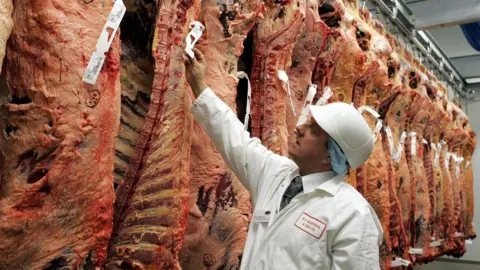Brexit: UK-New Zealand trade deal criticised by Edwin Poots
 Press Association
Press AssociationThe UK's trade deal with New Zealand has been heavily criticised by Stormont's agriculture minister.
Edwin Poots said the deal is a "very serious threat" to NI farmers.
It will mean that all tariffs or trade taxes will ultimately be removed from New Zealand's exports of lamb, beef and butter to the UK.
The Department for International Trade (DIT) said: "Tariff liberalisation... can be staged over time and will give UK farmers time to adjust."
Mr Poots said he long maintained tariff and quota protection must be retained for "sensitive agricultural products".
Quotas refer to the amount of a particular product a country is allowed to export before tariffs are imposed by the importing country.
New Zealand's quotas for lamb and beef exports to the UK will gradually be increased once the deal is implemented.
After 15 years quotas will no longer apply and all beef and lamb imports will be tariff free.
For butter, cheese and some other dairy products quotas will be removed after three years.
 Pacemaker
Pacemaker"I have been clear in my discussions with UK ministers that tariff-free access to the UK market for New Zealand farmers produce is a very serious threat to our farmers, even if that access is phased in over a number of years," said Mr Poots.
"New Zealand is a very significant and competitive beef, sheep and dairy exporter and has the potential to quickly increase exports further with a view to targeting the UK market."
The UK government said the deal will benefit consumers and businesses although a preliminary government analysis suggested the agreement would be marginally negative for the Northern Ireland economy.
That analysis did not consider the impacts of the Northern Ireland Protocol.
The Department for International Trade said farmers would thrive through the deal.
"New Zealand already have tariff-free access through its WTO quota, but in 2020 used less than half that quota.
"This deal will pave the way to joining the Indo-pacific free trade area that offers huge opportunities for Northern Ireland's farmers and food producers," the spokesperson added.
The protocol means that New Zealand food exports to Northern Ireland would likely be classified as "at risk" goods, meaning they would still face tariffs on entry.
That would mean Northern Ireland is not a particularly attractive market for New Zealand exporters.
However, New Zealand products having tariff-free access to the rest of the UK would mean greater competition for Northern Ireland producers in their largest external market.
"I fear that if the approach that the UK government has taken with Australia and New Zealand is confirmed in the ratified free trade agreement then the agriculture sector in Northern Ireland and the rest of the UK will in the future come under severe pressure from imports with a resulting negative impact on farm incomes and viability," said Mr Poots.
The minister said he was also disappointed at the the lack of involvement of the devolved authorities in the negotiations and "this is something that needs to change in the future".
